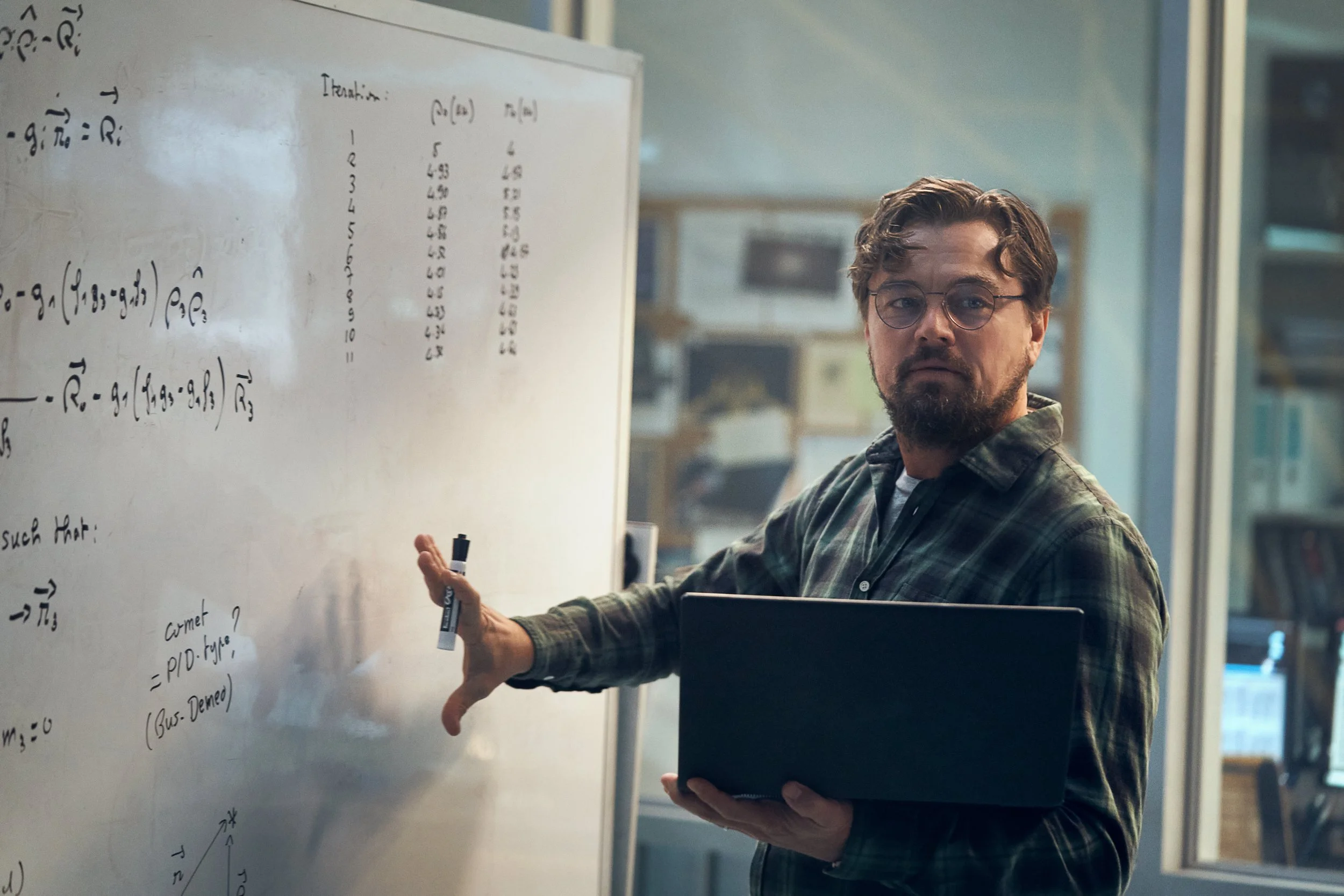In a cutting New Yorker cartoon by the writer-editor Robert Mankoff, a corporate CEO addresses his rapt audience of business associates by singing the virtues of a cataclysmic natural disaster. “And so,” he concludes, “while the end-of-the-world scenario will be rife with unimaginable horrors, we believe that the pre-end period will be filled with unprecedented opportunities for profit.”
And so it goes.
The early reviews for Don’t Look Up, filmmaker Adam McKay’s tart satire for Netflix about a pair of astronomers who try to warn humanity about an impending, world-ending meteor strike on planet Earth — by going on a media tour of breakfast-TV shows — have been unkind.
“‘Don’t Look Up’ … or you might see one bomb of a movie hurtling right toward you,” a heading reads in Rolling Stone. Reviewer David Fear goes on to dismiss Don’t Look Up as “a blunt instrument in lieu of a sharp razor … while [filmmaker] McKay may believe that we’re long past subtlety, it doesn’t mean that one man’s wake-up-sheeple howl into the abyss is funny, or insightful, or even watchable.” Don’t Look Up, he huffs, is a disaster movie in more ways than one, adding, “Should you indeed look up, you may be surprised to find one A-list bomb of a movie, all inchoate rage and flailing limbs, falling right on top of you.”
Well … yes, and no.
The plot is simple, if not exactly original, and will remind anyone familiar with impending end-of-the-world tales like those depicted in Michael Bay’s Armageddon, Roland Emmerich’s The Day After Tomorrow and perhaps especially Mimi Leder’s Deep Impact.
The story opens with a pair of idealistic scientists, played here by Leonardo DiCaprio and Jennifer Lawrence, who discover a 5-km wide comet — about the size of Mt. Everest — on a direct track to hit Earth in just six months’ time. The comet is bigger, wider and heavier than the one that destroyed the dinosaurs, which doesn’t portend a terrific future for humanity.
The astronomers try to warn the serving US president, played by Meryl Streep, and are discouraged to find a leader who cares more about her public image and the fast approaching midterm elections than a potential extinction event.
In an effort to get their message out to the wider public more directly, the reluctant pair hit the breakfast-TV circuit, where they find themselves fitted in between an A-list singer fretting over her recent relationship breakup and a neurotic, reclusive tech billionaire — is there any other kind? — who sees the comet as an opportunity to mine rare minerals and boost his company’s stock price.
McKay, who co-wrote and directed the media savvy Anchorman and Talladega Nights, is more angry than funny here, though Netflix is pitching Don’t Look Up as a feel-good comedy for the holidays, and more than a few reviewers have grumbled about the heavy-handed, obvious tone. Perhaps it’s the cutting — vicious, even — way McKay lays bare the inner workings of today’s media, where vacuous publicists, fey media managers and obsequious personal assistants have an outsized sense of themselves and everything is about controlling the message — “I think these people need media training” — than the message itself.
Social media, another favourite whipping post of today’s intellectual class, has presented a more interesting theory than what the traditional film reviewers have been writing, about Don’t Look Up’s real meaning. Followers of several Facebook climate groups and the campaign to warn the wider world about the effects of climate change have said Don’t Look Up isn’t about a comet but rather a larger allegory about the climate emergency and how today’s mainstream media is all too quick to buy into climate denialism.
That may or may not be true — I, for one, think the climate campaigners are onto something, and most if not all film reviewers are stuck in the cycle of reviewing exactly what’s in front of them — but one thing is certain: Don’t Look Up is a furious and cutting look at today’s media landscape and how it’s constantly shifting, from the way breakfast-TV shows shape and manipulate the message of the day to fit their own ends, to the people who work in media, both in front of and behind the camera. For that reason alone, it’s worth a look.
— Netflix

